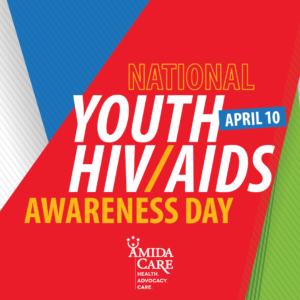National Youth HIV/AIDS Awareness Day: Increasing Access to Prevention and Treatment

As COVID-19 vaccinations become available for increasing numbers of people in the U.S., including teens, it’s more important than ever for young people to think about their health. With the loosening of pandemic restrictions and warmer weather, many Americans are starting to socialize in person again. This has unfortunately resulted in an uptick in new COVID-19 infections, many of them among people under 30. The coronavirus is especially worrisome for those living with or placed at elevated risk of contracting HIV. Multiple studies have shown that people living with HIV are more likely to be hospitalized and die if they get COVID.
Saturday, April 10 is National Youth HIV/AIDS Awareness Day, a day to focus on increasing awareness, generating conversations, and spotlighting the work being done to reduce HIV among young people.
According to the most recent statistics from the Centers for Disease Control (CDC), the number of new HIV diagnoses in 2018 was highest among people aged 25 to 34, with people 13 to 24 representing the second-highest group, making up 21% of new diagnoses nationwide. Among those newly diagnosed aged 13 to 24, 92% were young gay and bisexual men, the majority (51%) of whom identify as Black/African American.
As with national figures, in New York City in 2018, the majority of new HIV diagnoses among youth occurred among Black men; among women, young Black women are also disproportionately affected. The largest proportion of new HIV diagnoses among young women of color (Black/Latina) occurred in those aged 20 to 24 years. Sadly, young people with HIV are the least likely of any age group to quickly seek out health care and achieve viral load suppression (becoming “undetectable”).
According to the CDC, prevention challenges include:
• Inadequate sex education in schools
• Low rates of testing
• Low rates of PrEP (pre-exposure prophylaxis) use; a game-changing pill, PrEP is over 90% effective in preventing HIV
• Feelings of isolation leading to risky behaviors
• Stigma and misperceptions around HIV
Young people must have access to the information and tools they need to reduce their risk of HIV. Schools have a crucial role to play in teaching young people about taking care of their sexual health, preventing HIV and other STIs, and facilitating access to HIV counseling and testing services.
Resources
- Educational materials from New York State Department of Health
- Advocates for Youth
- CDC National Youth HIV/AIDS Awareness Day Resources
Amida Care can also help. Amida Care is a Medicaid Special Needs Health Plan (SNP) that serves 8,500 members throughout the five boroughs of New York City, including people living with HIV/AIDS; people of transgender experience, regardless of HIV status; and people who are experiencing homelessness, regardless of HIV status. Please contact us at 1-855-GO-AMIDA (1-855-462-6432, TTY 711) to be directed to more health resources or visit www.amidacareny.org.
